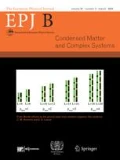Abstract:
A model for teaching-learning processes that take place in the classroom is proposed and simulated numerically. Recent ideas taken from the fields of sociology, educational psychology, statistical physics and computational science are key ingredients of the model. Results of simulations are consistent with well-established empirical results obtained in classrooms by means of different evaluation tools. It is shown that students engaged in collaborative groupwork reach higher achievements than those attending traditional lectures only. However, in many cases, this difference is subtle and consequently very difficult to be detected using tests. The influence of the number of students forming the collaborative groups on the average knowledge achieved is also studied and discussed.
Similar content being viewed by others
Author information
Authors and Affiliations
Additional information
Received 22 October 2001
Rights and permissions
About this article
Cite this article
Bordogna, C., Albano, E. A cellular automata model for social-learning processes in a classroom context. Eur. Phys. J. B 25, 391–396 (2002). https://doi.org/10.1140/epjb/e20020043
Issue Date:
DOI: https://doi.org/10.1140/epjb/e20020043




